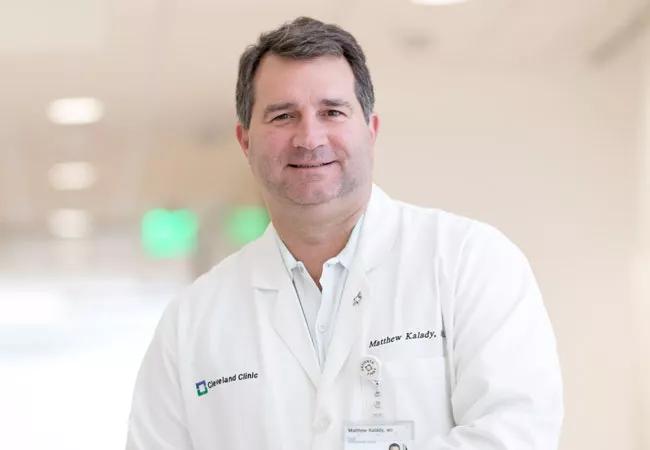Results suggest: Offer broad testing to all of them

Although the overall incidence of colorectal cancer (CRC) has been decreasing in the United States over the past 15 to 20 years, the incidence of early-onset CRC has been increasing, says Matthew Kalady, MD. He’s one coauthor of an important new study that used multigene panel testing to closely examine genetic mutations among CRC patients younger than 50. The researchers found that 16 percent of these patients did test positive for one or more genetic mutations, which might have important ramifications regarding heightened cancer risk for both the patients and their relatives.
Advertisement
Cleveland Clinic is a non-profit academic medical center. Advertising on our site helps support our mission. We do not endorse non-Cleveland Clinic products or services. Policy
The new study was published in JAMA Oncology’s December 15, 2016 online edition. “Previous studies have shown that multigene panel testing for hereditary CRC is feasible, timely and more cost-effective than single gene testing,” the authors wrote. However, this study is the first time in which researchers used multigene panel testing to look at potentially important mutations among patients with early-onset CRC.
The researchers enrolled 450 patients under age 50. The multigene panel testing revealed a total of 75 mutations which were present in 72 (16 percent) of patients. Importantly, 24 of those 72 patients did not meet established criteria for genetic testing for the gene(s) in which their mutation(s) appeared. Dr. Kalady says, “One-third of the 72 people who had mutations would not have been tested in routine practice.” This means, he adds, that with multigene panel testing, physicians have the potential to pick up one-third more mutations of possible clinical significance.
For example, Dr. Kalady says that under today’s guidelines, the standard approach for a patient with Lynch’s syndrome would be to test the tumor for genes associated with microsatellite instability or mismatch repair deficiencies. He compares the mismatch repair genes to DNA’s spell checker, since they fix errors when DNA is being duplicated.
The study of early-onset CRC patients was part of a larger study which included all CRC patients in Ohio, which is being run by the Ohio Colorectal Cancer Prevention Initiative (OCCPI). OCCPI is a statewide program involving 51 hospitals that screens newly diagnosed CRC patients and their biological relatives for Lynch syndrome, which is caused by the presence of a mismatch repair mutation in one of four genes and which heightens risk for not only CRC, but also uterine, ovarian, stomach and other cancers.
Advertisement
Although most young CRC patients currently have their tumors screened for Lynch syndrome using tests for known changes that accompany that syndrome, the new study’s findings strongly suggest that this limited genetic testing is insufficient, Dr. Kalady says. “The take-home clinical translation is that 16 percent of people under 50 with CRC [who undergo multigene panel testing will be found to] have something abnormal,” he says. “They might have a gene predisposing them for other cancers, for which they need to be screened.”
Dr. Kalady says when sending such early-onset CRC patients for multigene panel testing, they should also consult with a genetic counselor. That way, they will receive help understanding the results and how to use them for their own well-being, and for the well-being of other family members who should be tested and possibly enrolled in an intense screening program.
Dr. Kalady cautions of one important caveat: While the cost of multigene panel testing has come down, making far more information available affordably, our current ability to interpret the results of such tests is limited. The tests often reveal a mutation or variant of unknown significance, one that is clearly not normal, but whose clinical importance (or lack thereof) is not yet fully understood. In this study, 178 variants of uncertain significance were found in 145 patients (32.2 percent).
Over time, though, as one or another now-mysterious variant is reported more and more, a picture should emerge of any actual significance. “It might not be a variant of unknown significance anymore,” Dr. Kalady says, “It can reclassified as causative.”
Advertisement
Advertisement
Advertisement

Radiation therapy helped shrink hand nodules and improve functionality

Standard of care is linked to better outcomes, but disease recurrence and other risk factors often drive alternative approaches

Phase 1 study demonstrates immune response in three quarters of patients with triple-negative breast cancer

Multidisciplinary teams bring pathological and clinical expertise

Genetic variants exist irrespective of family history or other contributing factors

Study shows significantly reduced risk of mortality and disease complications in patients receiving GLP-1 agonists

Structured interventions enhance sleep, safety and caregiver resiliency in high-acuity units

Addressing rare disease and challenging treatment course in an active young patient